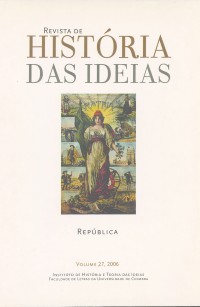Please use this identifier to cite or link to this item:
https://hdl.handle.net/10316.2/41658| Title: | O carácter histórico-social da violência: o exemplo da psicocirurgia | Other Titles: | The socio-historical character of violence: the example of psychosurgery | Authors: | Correia, Manuel | Issue Date: | 2006 | Publisher: | Imprensa da Universidade de Coimbra | Abstract: | O consenso institucional e as grandes expectativas quanto à possibilidade
de um desenvolvimento assombroso no conhecimento e controlo
do cérebro e do comportamento humanos, permitiram a generalização
das práticas psicocirúrgicas em grande escala. Os excessos, as brutalidades
e os abusos cometidos ao longo de anos, legitimados por avaliações
enviesadas, parcimoniosas e voluntaristas, interpelam directamente
cientistas e não cientistas.
No presente trabalho, sustentamos a hipótese de que a contenção e
moderação das práticas associadas à psicocirurgia se deveu a alterações
históricas de relevo. A derrota das potências do Eixo na II Grande Guerra,
a recodificação dos direitos e deveres de médicos, cientistas e pacientes,
reestruturou a ordem das relações, e influenciou decisivamente a criação
de novos entendimentos no âmbito dos quais o deslizamento cultural
deixou a descoberto, tornando-os insustentáveis, dispositivos e práticas
violentas até aí objecto de consensos vários.
O protagonismo dos neurologistas Egas Moniz e Walter Freeman na
fundação e generalização da psicocirurgia foi paradigmático e serve,
no texto seguinte, para localizar, no espaço e no tempo, alguns dos
desenvolvimentos mais significativos do processo. The institutional consensus and the great expectations regarding the possibility of an astonishing development in human behaviour and cerebral knowledge and control, allowed the generalization of the psychosurgical practices in large scale. The excesses, brutalities and abuses undertaken along the years, legitimated by biased assessments, partisans and voluntarisms, interplayed directly with non scientists and scientists. In the present work, we hold the hypothesis that the confinement and moderation of the practices associated with psychosurgery were due to historical relevant changes. The defeat of the II World War Axe's potencies, the recoding of rights and duties of physicians, scientists and patients, has restructured the order of relationships and decisively influenced the creation of new understandings and consensus around which the cultural sliding uncovered violent devices and practices supported until then by virtue of general consent, rendering them unbearable. The protagonism of neurologists Egas Moniz and Walter Freeman on the foundation and generalization of psychosurgery was paradigmatic and serve, in the following text, to notice in space and time, some more significant developments of this process. |
URI: | https://hdl.handle.net/10316.2/41658 | ISSN: | 0870-0958 2183-8925 (digital) |
DOI: | 10.14195/2183-8925_27_15 | Rights: | open access |
| Appears in Collections: | Revista de História das Ideias |
Files in This Item:
| File | Description | Size | Format | |
|---|---|---|---|---|
| o_caracter_historico-social_da_violencia.pdf | 8.8 MB | Adobe PDF |  |
Items in DSpace are protected by copyright, with all rights reserved, unless otherwise indicated.
